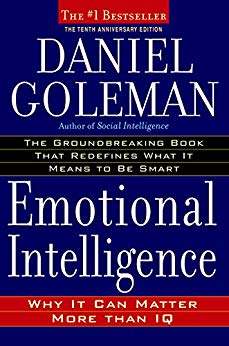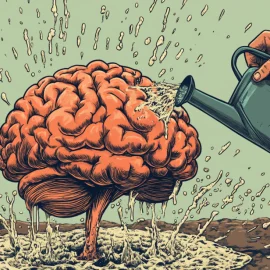

This article is an excerpt from the Shortform summary of "Emotional Intelligence" by Daniel Goleman. Shortform has the world's best summaries of books you should be reading.
Like this article? Sign up for a free trial here .
What is emotion? Why do we have them? What purpose do emotions have in our lives? What is the point of anger, sadness, jealousy, anxiety, and more?
What Are Emotions?
Emotions are strong impulses that urge us to take immediate action. The root of the word emotion is motere, the Latin verb meaning “to move.” Watch children or animals: they act almost immediately upon getting a feeling, before they know what they’re doing.
It’s a widely-held belief that emotions aren’t rational. But passionate emotional responses are designed to overwhelm reason. The more intense the emotion, the more it takes over.
Emotions have developed over centuries of evolutionary history. They’re based on fundamental needs, and designed to prevent our brain from thinking about tasks that are too important to leave to intellect alone. Our most powerful emotions want us to:
- Avoid danger to survive.
- Suffer loss but survive.
- Reach a goal despite obstacles, usually to survive.
- Find a mate and bond with them, for ultimate survival in the form of children.
- Keep the family alive to ensure survival of genes.
These situations repeated over and over again throughout the history of humankind, and if the reactions kept us alive, then they got embedded more deeply into our systems and became automatic responses. Most of them involve life or death, surviving or perishing. This was useful for our ancient ancestors, but nowadays most people rarely face life or death scenarios–yet our emotions still perceive things this way.
As we became more civilized, society had to develop and implement rules to rein in our emotional reactions, or create consequences for when we could not control our emotions. Humans can’t be expected to control their emotional responses unless there are negative results they understand. And there’s nothing wrong with feeling emotions–the problems arise when the emotions are out of tune with the situation and when we don’t express our emotions productively or safely.
The Science Behind Emotions
The development of the human brain–both evolutionarily and in our biological development from conception to old age–reflects the hierarchy between our emotional mind and our rational mind.
The human brain essentially grew from the bottom up. We share the primitive part of our brain–the brainstem–with all species who have more than a simple nervous system, and this part of the brain controls our basic and necessary functions: breathing, the metabolism of our organs, preprogrammed reactions and movements such as shrinking from pain.
From the brainstem emerged the emotional center, our limbic system, which refined two important skills: the ability to learn and the ability to remember. This development allowed us to make conscious decisions in relation to our environment and smarter choices for survival.
From the emotional center emerged the rational mind, our neocortex. This part of the human brain is three times as large as the neocortex of our evolutionary next of kin, nonhuman primates. The neocortex also contributes to a more complex emotional life: it’s the reason we can have feelings about our feelings.
This development explains why emotions can supercede our rationality–they’re more or less second in command in our brains. The emotional brain is quick to respond but sloppy. First we have feelings; second, thoughts.Emotions can come after thoughts, but this is a slower process happening in the brain: as we take in stimuli, our rational mind reflecting on the input leads to conclusions that spark an emotional reaction. For example, you get into a cab and know the general direction you’re heading–but the driver heads off in a different direction. You observe for a few minutes and come to the conclusion “this driver is swindling me”–and then you get angry.
———End of Preview———

Like what you just read? Read the rest of the world's best summary of Daniel Coleman's "Emotional Intelligence: Why It Can Matter More than IQ" at Shortform . Learn the book's critical concepts in 20 minutes or less .
Here's what you'll find in our full Emotional Intelligence summary :
- What are emotions? Why do we have them?
- What is emotional intelligence? Why is it important?
- How do you manage your own emotions? Anger, anxiety, and sadness?
- How can you approach your relationships with more emotional intelligence?
- How can you teach your children emotional intelligence?
- How can emotional intelligence boost your career?






